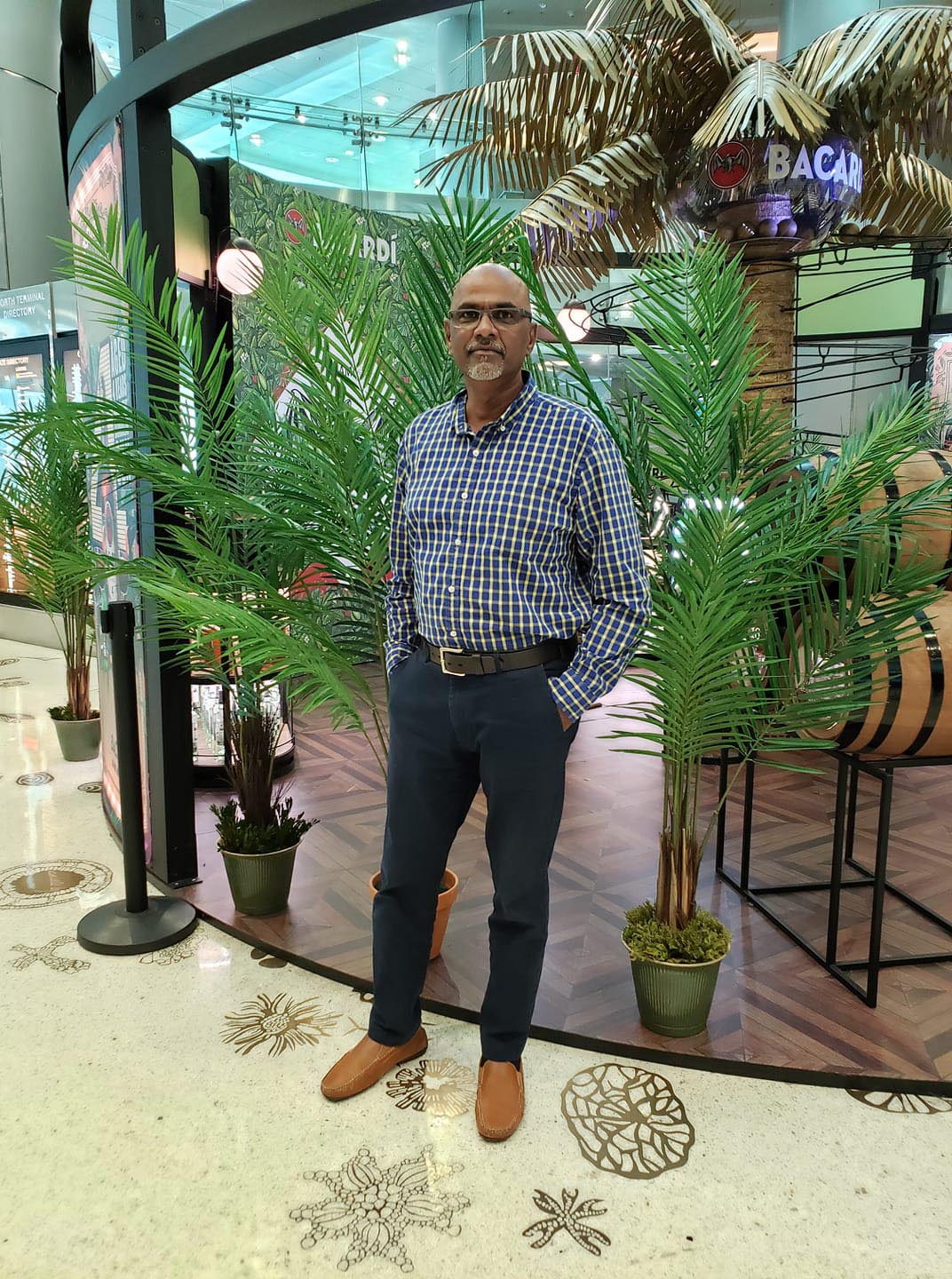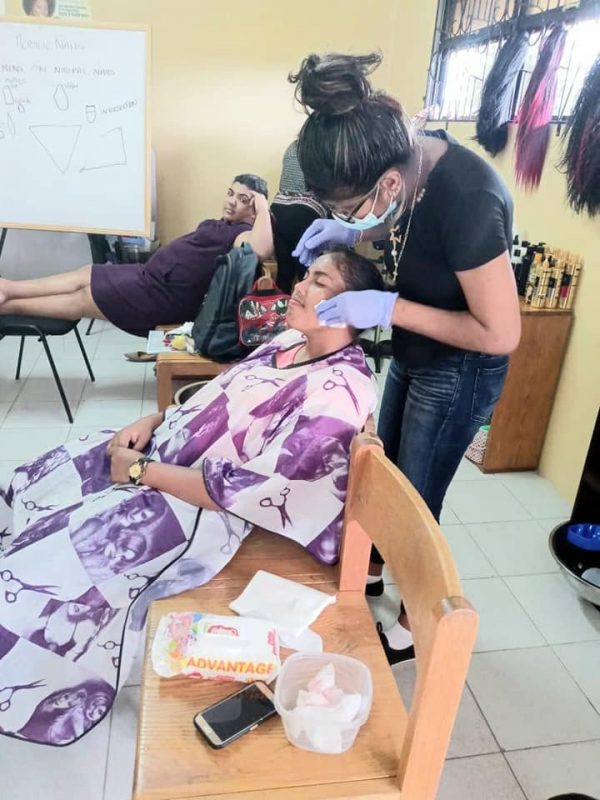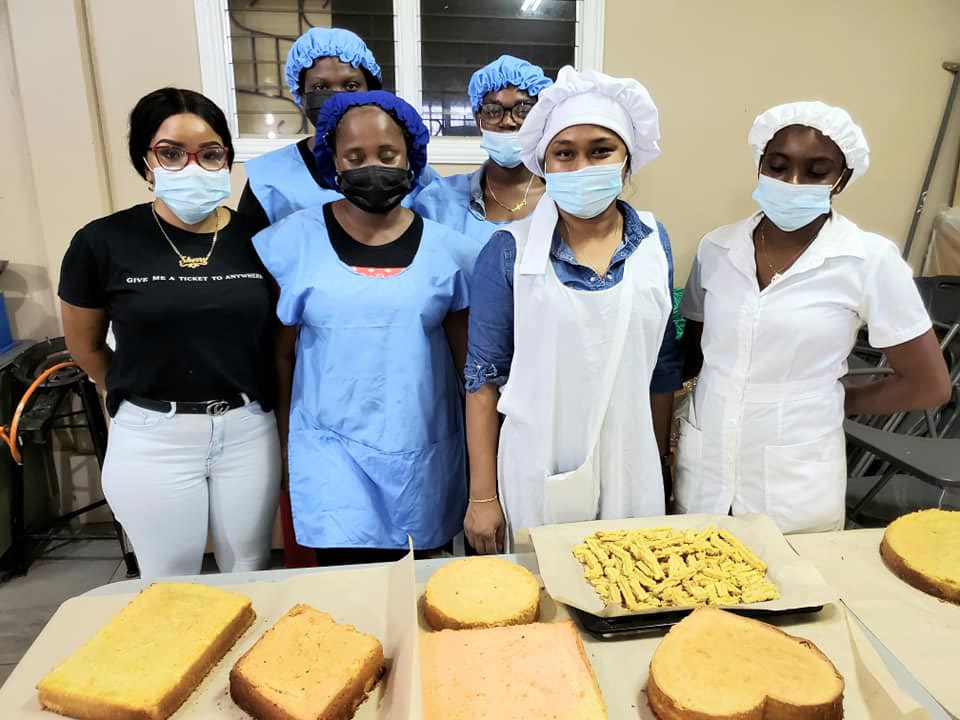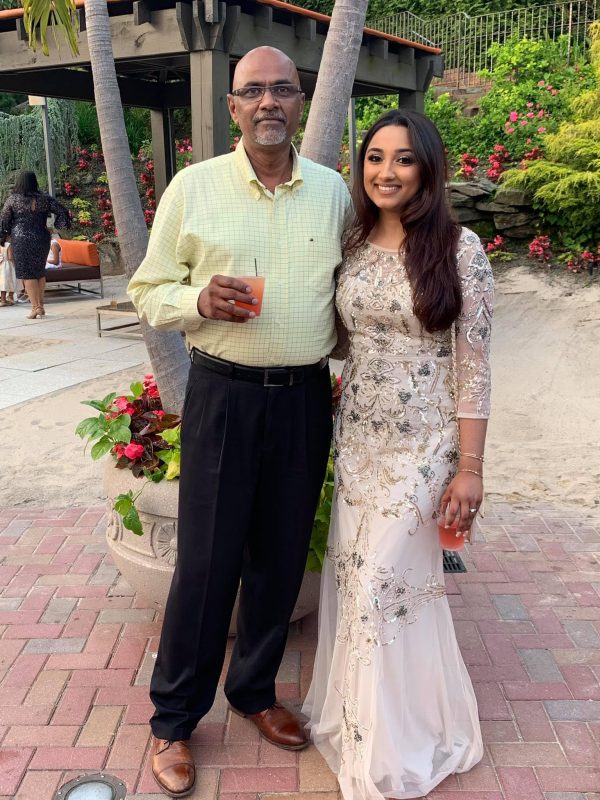United States-based Guyanese Suresh Sugrim, 60, lived as an illegal immigrant for ten years in the US and ten years after he became a US resident, as a pandit, he formed the New Jersey Arya Samaj (NJAS) which gave birth to the Humanitarian Mission (Guyana) Inc (HMI) in Port Mourant, Corentyne in 2005. He then walked away from religion in 2015/2016 to serve humanity.
He said, “I acknowledge the presence of God but I also acknowledge the presence of God’s children. If we all preach the word of God, then who will take care of the fallen men and women? People will look down on each other or not talk to each other because of certain social ills. My calling is to pick up those individuals, put them in my heart and tell them that tomorrow will be a better day.”
In a recent interview, Sugrim told Stabroek Weekend that in 2015, the HMI was delinked from the NJAS to become an independent organisation with no affiliation to race, religion or politics.
As an individual and as the founder of HMI, Sugrim said, his vision is to educate, empower and elevate less fortunate individuals in the US and in Guyana by helping them to overcome challenges of earning a livelihood, and to build and promote their self-esteem.
“As long as we educate you, we can empower you. As long as we empower you, we can elevate you to break the cycle of poverty and you can start to do bigger and better things with your life,” he said.
Sugrim was born in Skeldon, Corriverton. He attended the then Skeldon Scot School. “I went up to about Form Three and I didn’t write any examinations. I hadn’t a chance to go to high school. I don’t have a college degree. By the grace of God, I made it,” he said.
He went to the US in 1980 and encountered challenging times as an illegal immigrant.
“When I left Guyana, I had no family or friends in the US. When I got over there I was rescued by an African American. He took me to his home and kept me there for some time,” he said. “Unfortunately for me, he was moving from New York to Alabama. After he moved I was left on my own. I went on the street for a little while and then I found my way to New Jersey, met with some old friends and they all helped me. I got involved in religion once again, as I had been a Hindu priest in Guyana. Things were better after that. After ten years, I got my immigration status in order and I started improving my life.”
He left Guyana, he said, “Because back in those days we were told that America was a paradise. We were told you could walk and pick up money in the streets. It is only until you get there that you see what America is about. It’s a land of opportunity but nothing is given on a silver platter.”
He worked with the police department as a service technician in the municipality of New Jersey for 24 years then took early retirement.
Birth of HMI
In 1990, he returned to Guyana for the first time and while making his way from Rosignol to New Amsterdam, Sugrim said, he saw a girl, “fully developed who was walking naked and begging on the Rosignol Stelling.” The girl appeared to have had a mental issue so he took out some clothing he had in a suitcase and asked a woman to clothe her.
He also gave the woman some money to assist the girl.
On his return to the US, he met with the board of directors of the NJAS, where he was a pandit and proposed the formation of the HMI in Guyana. The board agreed, but could not provide the funding. However, the NJAS was committed to assisting in raising funds within the folds of the organisation. Thereafter, Sugrim travelled to and from Guyana using his own funds.
The organisation came into being in 2005. At present it is governed by a board of directors with Dr Shilendra Sugrim as president, Suresh Sugrim as secretary/chief executive officer and Shafeeza Nandalall, director. The HMI has a full-time administrator and an assistant administrator who run the day-to-day operations.
“For a period, we were the champions of handouts. We spent from about US$1,000 and US$1,500 in the beginning to US$30,000 and US$40,000 a year in handouts. Realising that handouts were not the answer to address poverty and were just temporary fixtures to the issues, we did some evaluations and looked at other means to change the lives of individuals,” Sugrim said.
The board agreed to focus on technical and vocational skills in Berbice to help individuals who had completed their education because of poverty or other reasons.
HMI’s motto is that as long as young or unemployed people are willing to use their hands, hearts and heads, they could change their status for the better and break the cycle of poverty by learning a skill. HMI offers skills training in cosmetology with a focus on nails, hair and face; sewing; cake decoration; cooking; information technology and electrical repairs.
“It is not about race, religion and politics, it is about humanity,” Sugrim said. “Catering and cosmetology have been successful particularly among women who walked away from abusive relationships,” he added.
While government or businesses may not be able to hire everyone, Sugrim said, learning certain types of skills can enable people to be independent as they can become entrepreneurs.
A non-governmental organisation working in Guyana but dependent on the diaspora to fund it, Sugrim said has been challenging to run and ways are being sought to make it economically viable.
Locally, HMI has received assistance from commercial institutions like Demerara Distillers Limited, Banks DIH, Demerara Bank, New Building Society and Gafoor and Sons Ltd.
“If it were not for our local and international donors, Humanitarian Mission Guyana Inc would not be what it is today,” he said.
Not knowing what the future holds, Sugrim said, at present, the organisation is focusing on how to go forward with skills training classes. Prior to now, he said, the classes were offered free of cost. “We would pay the teachers, buy the materials; sometimes those targeted would not show up. So what we are doing now is charging $3,000 a month. That $3,000 gives them the sense of responsibility of coming to classes.
We have no volunteer teachers so we use that fee to pay the teachers,” he said.
Other operational expenses for HMI are covered by the benevolence of donors.
For single parents, especially mothers, he said, HMI would find a way to give free classes. “We want you to be independent and not to use your body to make a living. What I would do from time to time is to get sponsors for some of the women who cannot afford the fee,” he added.
Sugrim wishes the government would see the merit of what the organisation is doing and assist in facilitating its work to better serve the people.
To date HMI has assisted the less fortunate with clothing, food hampers for senior citizens and shut-ins, monthly food vouchers for persons with disability, school supplies, uniforms, bicycles, and funds for students writing the Caribbean Examinations Council’s exams. It has built houses for single mothers and low-income families, done medical outreaches, and assisted with local and international travel for medical treatment. In addition, HMI has given interest free loans to single mothers and low-income families, financial support for victims of domestic violence, paid funeral expenses for suicide victims, and distributed items to newborn babies and mothers among other things.
Just last month, the HMI donated $100,000 to a 25-year-old man who is currently on dialysis. The funds were raised in a telethon by Dr Shilendra Sugrim and were for a young woman who was on dialysis. Unfortunately, the woman died and the remaining fund is now being used to help patients on dialysis.
From 2005 to the present, Sugrim said, HMI trained about 4,000 people. Training began even before the building from which it now operates, was commissioned in 2015.
“Those who came with nothing, left with a skill. Those who did not know how to sew, how to thread a machine or how to read a tape measure, learnt. Those who did not know how to measure ingredients and how to bake a cake or pastries, all left knowing how to do all these things. When they finish their respective training they would go back to their homes and community and cater for their families, weddings, birthdays and parties in general,” Sugrim said.
The organisation has networked with other NGOs as well as the ministries of Education, Health and Social Protection, and the University of Guyana (UG).
Sometimes UG would reach out to HMI to ask to use its facility to host programmes or to accommodate students pursuing courses in social work or related areas. They discuss in workshops and seminars issues of suicide and mental health, teenage pregnancy, domestic violence, substance abuse, parenting skills with emphasis on fathers as role models and how to address the many social problems affecting the national community including counselling for young people.
“We had been talking about getting a men’s group going but we haven’t had the opportunity of doing so because of a lack of volunteers,” he said.
“We chose parenting because some of our men are sperm donors and some mothers would even sell their bodies to take care of their children who are abandoned by their fathers. I don’t subscribe to deadbeat fathers and mothers who have walked away and abandoned their children. I take issue with our men who are missing in the home.”
Sugrim suggested that the government enforce laws against deadbeat fathers since there is a breakdown in the system where they appear before magistrates, are ordered to pay X amount and once released they disappear.
There is a need, he said, to educate young men and young women on how to respect themselves and to build self-esteem. To young women, he said, “Your body is your temple. Don’t allow men to walk through your temple with their dirty feet, and to young men, be responsible and let it not be just about sex and you gone.”
If husband and wife or boyfriend and girlfriend cannot get along, he said, “Don’t hurt the females. Let them go. Don’t chop them. Don’t shoot them. Don’t kill them. Girls and women are not your personal property. You do not have the right to harm them. You can’t get along in a relationship, just pack up and leave.”
By example
Sugrim is against domestic violence and deadbeat parents. As the father of a son and a daughter, he said, “I was a divorced single parent. I had full custody of my daughter. My daughter’s education was my number one priority.”
He did the cooking, laundry and all the housework. “Even though she’d asked me to help,” he said, there were times when he had to ensure that her priority was her studies. “One of the best gifts parents can give their children is the gift of an education.”
Reminding that former president, David Granger once said that if you hang out at bars you will remain poor, he said, parents who take their paycheck and hang out at the bar and take home very little or nothing cannot raise a proper family.
Calling on parents to be better parents than their parents were, he said, “I saw my father drinking, but I chose not to drink. I saw my father smoking, but I chose not to smoke. I am the baby in the family and I saw my brothers drinking and smoking but I chose not to. Myself and my brother Dr Ramesh Sugrim do not smoke.”
There were five brothers in his family, he said. People would ask him if there were only two brothers in the family, he said, “I would say, no. People don’t know the others because of the life they chose.”








